On May 6, 2011, in observance of the fourth anniversary of the good faith community referendum of the municipality of Ixcán, El Quiché, representatives of organizations and communities from across the municipality gathered in the community of Ascención Copón, on the banks of the Copón river, to reaffirm the results of the referendum and denounce the environmental degradation observed along the Xalbal and Copón rivers. They likewise denounced the intentions of the central government to move forward with the Xalalá hydroelectric dam project, as well as exploration for oil, in spite of the population’s rejection of such initiatives expressed in the good faith community referendum carried out on April 20, 2007. The communities and organizations also expressed their rejection of the central government´s current proposal to regulate the application of ILO Convention 169 in the country, which would control how community referenda regarding extractive projects are carried out. The complete pronouncement is reproduced below, and a videoreport (in Spanish) about the anniversary activities by the Guatemalan journalist Santiago Botón can be seen here.
 |
| A child washes his hands in the muddy water of the Copón River. In the background, the blue water of the Chixoy River can be seen. Graham Hunt |
 |
| A view of the confluence of the Copón and Chixoy rivers taken three years earlier, in April 2008. Photo courtesy of Comisión de Seguimiento de la Consulta de Ixcán. |
PRONOUNCEMENT OF THE ORGANIZATIONS AND COMMUNITIES OF ICXÁN ON THE FOURTH ANNIVERSARY OF THE GOOD FAITH COMMUNITY REFERENDUM.
Four years after having carried out the good faith community referendum in the municipality of Ixcán, in which the majority of participants rejected the construction of hydroelectric dams and the extraction of petroleum within our territory, as communities and organizations from across the municipality we have come together in the community of Ascención Copón to reaffirm the results of the referendum.
Currently, our land and natural resources continue to face serious threats, among them
W E D E N O U N C E
a) The contamination of the Copón River resulting from the construction of the Palo Viejo hydroelectric dam, on the Finca San Francisco plantation. The contamination of the river has hurt thousands of families from the municipalities of Uspantán, Ixcán and Cobán that use river water for their basic needs, especially during the summer. The government claims that hydroelectric dams do not pollute but this is not true. The environmental impact study, conducted by the Italian company ENEL and approved by the MARN (Ministry of Environment and Natural Resources)
[claimed] that only 500 or 1,000 meters of the river [would be] dirtied, but what we are seeing is that the construction dirties the entire Copón River and reaches the Chixoy River.
b) Ecological impact on the Xalbal River. As of the construction and operation of the Hidroxacbal dam in the municipality of Chajul, the flow of of the Xacbal River, which gives life to hundreds of communities in the municipalities of Chajul and Ixcán, has changed. Currently, the water arrives dirty and the river rises and falls unpredictably, putting the lives of the women and children who use the water at risk.
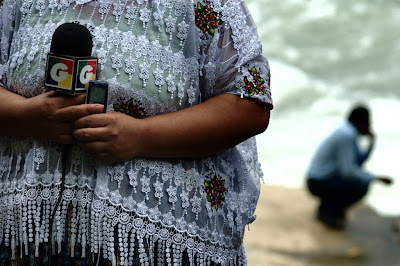 |
| Guatemalan journalist Santiago Botón covered the activities carried out on the occasion of the fourth anniversary of the referendum of Ixcán, as well as the degradation of the Copón and Xalbal rivers. Graham Hunt |
c) Xalalá hydroelectric project. In spite of the telling rejection expressed in the community referenda carried out in the municipalities of Uspantán and Ixcán, the government insists on moving forward with the construction of the Xalalá dam, which will flood the best lands of 50 Q’eqchí communities in the municipalities of Cobán, Uspantán and Ixcán. Currently, the INDE (National Electrification Institute) is carrying out a social study with the goal of convincing the communities to accept this project through trickery and supposed development projects. Even when the companies give us zinc roofing and electricity, what are we going to eat if they flood our best lands?
d) San Luís hydroelectric project. The Generación Limpia de Guatemala company, a subsidiary of Unión FENOSA, attempted to build the San Luís hydroelectric dam on the Xacbal River, between the municipalities of Chajul and Ixcán. The project is now suspended thanks to the resistance of the affected communities that denounced the tricks and threats. This project left an open wound in the communities, and people who do not agree are still threatening to cut the water supply to the communities that opposed this megaproject.
e) Petroleum grant. Last October 25, 2010, the MEM (Ministry of Energy and Mines) emitted an exploration license for two petroleum exploration areas, affecting two thirds of the territory of the municipality. The government is inviting foreign companies to invest in our territories, but at no time have we been consulted. The government has disregarded the results of our community referendum.
f) Sale of lots for the planting of African palm. The government and companies are promoting the planting of African palm, which leads to dried up and infertile land. This economic policy is provoking the re-concentration of the land [in few hands] in El Petén, Alta Verapaz and El Quiché.
 |
| Graham Hunt |
g) Regulation of referenda. The government and companies are promoting regulation to control community referenda, without taking into account that ILO Convention 169 and the Declaration of the United Nations on the rights of Indigenous Peoples recognize our right to decide our development priorities as, well as recognizing, the obligation of the State to obtain our free, prior and informed consent before authorizing any license or project. Likewise, the government looks to leave without effect the referenda carried out in 50 municipalities, in which the population has manifested its rejection of megaprojects. What the government should regulate is its duty to consult and protect indigenous territories against the voracity of companies, and not the right we have to decide regarding our own development.
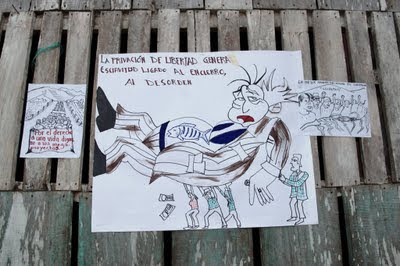 |
| Graham Hunt |
In view of these facts, we, the communities and organizations of Ixcán
D E M A N D
-
That the government and companies respect the results of the 50 referenda that have been carried out.
-
The cancellation of the proposal to regulate community referenda, as it limits our rights as Indigenous Peoples and favors companies.
-
We reject the re-militarization of our region and the illegal presence of soldiers in our communities, such as that which occurred on May 5 [in] Santa María Tzejá, when the army searched the Zona Reina Cooperative without a court order.
-
The annulment of license 299-2010 for petroleum exploration in the municipality of Ixcán. We remind the government that the Constitutional Court has pronounced that any license granted without the necessary consultation and consent of the communities is illegal, and therefore we, the communities, are not going to allow the presence of petroleum companies in our territory.
-
We condemn the use of violence as a response to social demands, as occurred recently in the Polochic area, where government forces burned houses, destroyed crops, and attacked unarmed campesinos, as they did during the internal armed conflict, thus violating the right of Q’eqchí communities to land, food, and housing. We demand investigations and that the material and intellectual authors of the crimes and damages be condemned.
We unite ourselves with the just struggles of our brothers and sisters in Huehuetenango, Quiché, San Marcos, Alta Verapaz, Petén, Chiquimula, Jalapa and other departments in defense of our Mother Earth.
We call upon neighbor communities and municipalities not to let themselves be deceived by companies in exchange for zinc roofing and aid projects. The health, food, and life of our communities are worth more than all the gold in the world.
Likewise, we must not let ourselves be divided or allow ourselves to be deceived by the promises made by the traditional political parties. We demand of the candidates their commitment to respect the results of our community referenda.
WATER, LAND AND ENERGY ARE NOT MERCHANDISE!
FOR LIFE, LAND AND DIGNITY!
Comisión de Seguimiento Consulta Comunitaria Ixcán
Ixcán, El Quiché, May 6, 2011
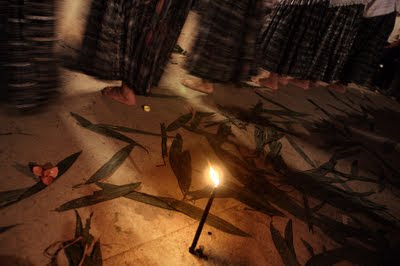 |
| Graham Hunt |
.





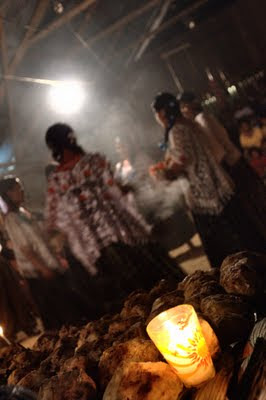
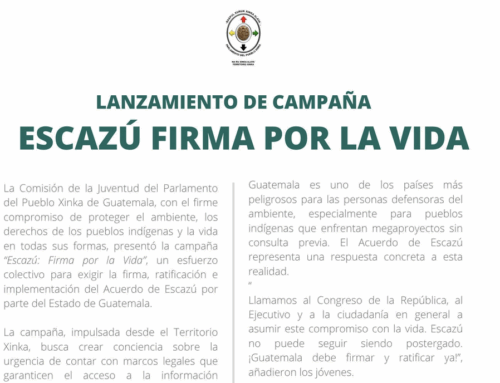


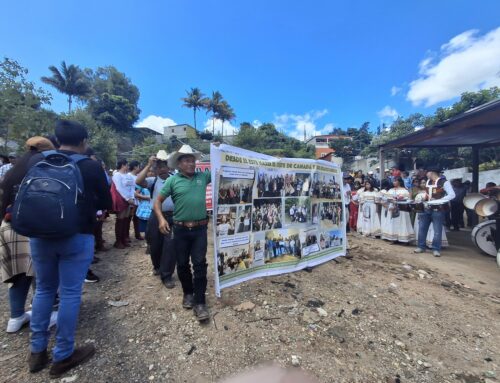
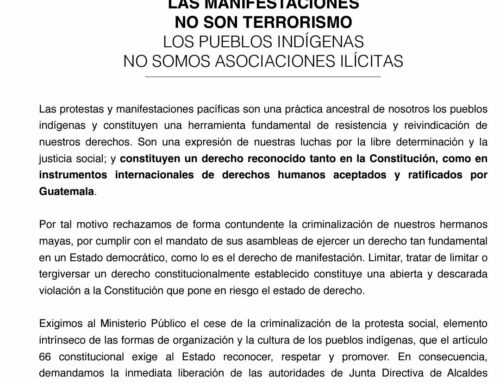
Leave A Comment